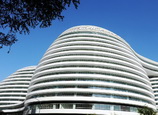
THEORETICAL GROUNDING, GLOBAL VISION
Unlike their predecessors, the new leaders grew up in a peaceful time, which offered them a chance to receive better education than previous generations.
Notably, they received a complete and systematic education on the mainstream ideology of socialism, which had a formative effect on their views and values, said Dai Yanjun, a professor with the Party School of the CPC Central Committee.
The seven leaders have diverse higher learning backgrounds, varying from engineering to humanities.
Xi holds a doctorate of law from the prestigious Qinghua University, where he also received education in chemical engineering after he returned to Beijing from Shaanxi.
Li studied law at the elite Beijing University after he ended "re-education" in Anhui province. He later received a doctoral degree of economics from the university.
These education opportunities equipped the leaders with a firm theoretical grounding.
Xi has urged officials at various levels to "read some history" and learn to "seek the correct orientation and path from history."
As witnesses and participants in ongoing globalization, the new leaders also have a broad vision and know how to deal with the international community.
Xi Jinping made a successful visit to the United States in Feburary this year. In a written interview with the Washington Post before his tour, the vice president said, "The vast Pacific Ocean has ample space for China and the United States."
As vice premier, Li Keqiang visited the three European nations of Spain, Germany and Britain in January 2011. Prior to his visits, he wrote three articles that were published in influential newspapers in the countries, stating China's development orientation.
Another vice premier, Wang Qishan was described by former U.S. Secretary of the Treasury Henry Paulson as a man who "enjoys philosophical debates and has a wicked sense of humor."
















 'Gangnam style' life of young rich in Chongqing
'Gangnam style' life of young rich in Chongqing


![]()
